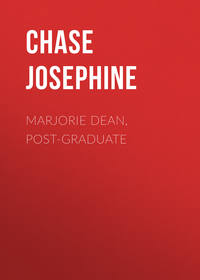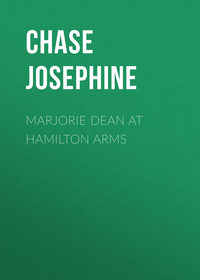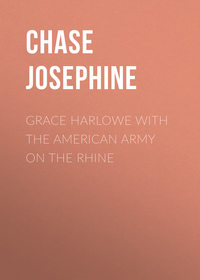 полная версия
полная версияMarjorie Dean, High School Junior
Obeying the familiar mandate, which peered at her from newspaper, store or street car, “Do Your Christmas Shopping Early,” she lovingly stored away the numerous beribboned bundles designed for intimate friends at least a week before Christmas. That last week she left open in order to go about the business of making a merry Christmas for the needy. As on the previous year Jerry Macy and Constance were her right-hand men. Susan, Irma, Muriel and Harriet also caught the fever of giving and the six girls worked zealously, inspired by the highest motives, to bring happiness to the poverty-stricken.
Christmas morning brought Marjorie an unusual windfall of gifts. It seemed as though everyone she liked had remembered her. Looking back on the previous Christmas, she remembered rather sadly the Flag of Truce and all that it had signified. This year Mary and she were again one at heart. She dropped a few tears of sheer happiness over Mary’s long Christmas letter and the beautiful embroidered Mexican scarf that had come with it. She had sent Mary a wonderful silver desk set engraved with M. to M., which she hoped wistfully that Mary would like as much as she cherished her exquisite scarf.
The Christmas vacation was, as usual, a perpetual round of gaiety. Jerry and Hal gave their usual dance. Constance gave a New Year’s hop. Harriet and Muriel entertained their friends at luncheons, while Marjorie herself sent out invitations for an old-fashioned sleigh-ride party, with an informal supper and dance at her home on the return. These social events, with some few others of equal pleasure, sent Father Time spinning along giddily.
“Aren’t you sorry it’s all over?” sighed Constance, as she and Marjorie lingered at the Macys’ gate at the close of their first day at school after the holidays.
“Sorry’s no name for it,” declared Jerry. “We certainly had one beautiful time, I mean a beautiful time. Honestly, I liked the getting things ready for other folks best of all, though. I like to keep busy. I wish we had something to do or somebody to help all the time. I’m going to poke around and see what I can stir up. I try to do the sisterly, helpful act toward Hal; picking up the stuff he strews all over the house and locating lost junk, I mean articles, but he’s about as appreciative as a Feejee Islander. You know how grateful they are.”
“I saw one in a circus once,” laughed Constance reminiscently. “I wasn’t impressed with his sense of gratitude. Someone threw him a peanut and he flung it back and hit an old gentleman in the eye.”
A general giggle arose at the erring Feejee’s strange conception of gratitude.
“That will be nice to tell Hal when he shows the same delicate sort of thankfulness,” grinned Jerry. “I’m not going to waste my precious talents on him all winter. I’m going to dig up something better. If you girls hear of anything, run all the way to our house, any hour of the day or night, and tell your friend Jerry Geraldine Jeremiah. All three are one, as Rudyard Kipling says in something or other he wrote.”
“I love Kipling’s books,” said Constance. “One of the first things I did when I wasn’t poor any longer was to buy a whole set. That first year at Sanford High I tried to get them in the school library. But there were only two or three of them.”
“That library is terribly run down,” asserted Jerry. “They haven’t half the books there they ought to have. I was talking to my father about it the other night. He promised to put it before the Board. I hope he does. Then maybe we’ll get some more books. I don’t care so much for myself. I can get all the books I want. But there are a lot of girls that can’t, who need special ones for reading courses.”
Jerry’s resolve to “poke around and stir up something” did not meet with any special success. The more needy of the Christmas poor were already being looked after by Mrs. Dean, Mrs. Macy and other charitably disposed persons who devoted themselves to the cause of benevolence the year around. Generous-hearted Jerry continued to help in the good work, but her active nature was still on the alert for some special object.
“I’ve dug it up,” she announced in triumph, several evenings later. The three girls were conducting a prudent review at Jerry’s home, preparatory to the rapidly approaching mid-year test.
“What did you say, Jerry?” Marjorie tore her eyes from her French grammar, over which she had been poring. “I was so busy trying to fix the conjugation of these miserable, irregular verbs in my mind that I didn’t hear you.”
“I’ve dug up the great idea; the how-to-be-helpful stunt. It’s right in our school, too, that our labors are needed.”
“That’s interesting; ever so much more so than this.” Constance Stevens closed the book she held with a snap. “I’m not a bit fond of German,” she added. “I have to study it, though, on account of the Wagner operas. This ‘Höher als die Kirche’ is a pretty story, but it’s terribly hard to translate. We’ll have several pages of it to do in examination. Excuse me, Jerry, for getting off the subject. What is it that you’ve dug up?”
“It’s about the library. You know I told you that my father was going to speak of it at the Board meeting. Well, he did, but it wasn’t any use. There have been such a lot of appropriations made for other things that the library will have to wait. That’s what the high and mighty Board say. This is what I say. Why not get busy among ourselves and dig up some money for new books?”
“You mean by subscription?” asked Marjorie.
“No, siree. I mean by earning it ourselves,” proposed Jerry. “Subscription would mean that a lot of girls would feel that they ought to give something which they couldn’t afford to give. Then there’d be those who couldn’t give a cent. That would be hard on them. What we ought to do is to get up some kind of a show that the whole school would be interested in.”
“That’s a fine idea. It’s public-spirited,” approved Marjorie. “What sort of entertainment do you think we might give? We couldn’t give it until after examinations, though.”
“I know the kind I’d like to give, but I can’t unless a certain person promises to help me,” was Jerry’s mystifying reply.
“Miss Archer?” guessed Constance.
“Nope; Connie Stevens.” Jerry grinned widely at Constance’s patent amazement.
“I?” she questioned. “What have I to do with it?”
“Everything. You could coax Laurie Armitage to help us and then, too, you’d be leading lady. Do you know now what I’m driving at? I see you don’t. Well, I’d like to give the ‘Rebellious Princess’ again, one night in Sanford and the next in Riverview. That is only twenty-five miles from here. A whole lot of the Sanfordites were disappointed last year because they couldn’t get into the theatre to see the operetta. Another performance would pack the theatre, just as full as last Spring. I know the Riverview folks would turn out to it. There are two high schools in Riverview, you know. Besides, we have the costumes and everything ready. Two or three rehearsals would be all we’d need. If we tried to give an entertainment or a play, it would take so long to practise for it. Have I a head on my shoulders or have I not?”
“You certainly have,” chorused her listeners.
“I am willing to do all I can,” agreed Constance. “I’ll see Laurie about it to-morrow.”
“Oh, you needn’t wait until then. He’s downstairs now with Hal and Danny Seabrooke. I told Hal to ask the boys over here this evening. We can’t study all the time, you know. I suppose they are ready to tear up the furniture because we are still up here. Danny Seabrooke is such a sweet, patient, little boy. Put away your books and we’ll go down to the library. Since this is a library proposition, let’s be consistent.”
A hum of girl voices, accompanied by the patter of light feet on the stairs, informed three impatient youths that they had not waited in vain.
“At last!” exclaimed the irrepressible Daniel, better known as the Gad-fly, his round, freckled face almost disappearing behind his Cheshire grin. “Long have we sought thee, and now that we have found thee – ”
“Sought nothing,” contradicted Jerry. “I’ll bet you haven’t set foot outside this library. There’s evidence of it.” She pointed to Hal and Laurie, who had just hastily deposited foils in a corner and were now more hastily engaged in drawing on their coats. “You’ve been holding a fencing match. Laurie came out best, of course. He always does. He’s a fencing master and a musician all in one.”
“Jerry never gives me credit for anything,” laughed Hal. “That is, in public. Later, when Laurie’s gone home, she’ll tell me how much better I can fence than Laurie.”
“Don’t you believe him. He’s trying to tease me, but I know him too well to pay any attention to what he says.” Jerry’s fond grin bespoke her affection for the brother she invariably grumbled about. At heart she was devoted to him. In public she derived peculiar pleasure from sparring with him.
The trio of girls had advanced upon the library, there to hold a business session. But the keynote of the next half hour was sociability. It was Constance who first started the ball rolling. Ensconced beside Laurie on the deep window seat, she told the young composer that Jerry had a wonderful scheme to unfold.
“Then let’s get together and listen to it,” he said warmly. Three minutes afterward he had marshalled the others to the window seat. “Everybody sit down but Jerry. She has the floor. Go ahead, Jerry. Tell us what you’d like us to do.” He reseated himself by Constance. Laurie never neglected an opportunity to be near to the girl of his boyish heart.
Posting herself before her hearers with an exaggerated air of importance, Jerry made a derisive mouth at Danny Seabrooke, who was leaning forward with an appearance of profound interest, which threatened to land him sprawling on the floor. “I’m not used to addressing such a large audience,” she chuckled. “Ahem! Wow!” Having delivered herself of these enlightening remarks she straightened her face and set forth her plan with her usual brusque energy. She ended with: “You three boys have got to help. No backing out.”
“Surely we’ll help,” promised Laurie at once. “It’s a good idea, Jerry. I can have things going inside of a week. That is, if my leading lady doesn’t develop a temperament. These opera singers are very temperamental, you know.” His blue eyes rested smilingly on Constance.
“I’m not an opera singer,” she retorted. “I’m only a would-be one. Would-be’s are very humble persons. They know they must behave well. You had better interview your tenor lead. Tenors are supposed to be terribly irresponsible.”
Amid an exchange of equally harmless badinage, the six willing workers discussed the plan at length. So much excited discussion was provocative of hunger. No one, except Hal, said so, yet when Jerry disappeared to return trundling a tea wagon, filled with delectable provender, she was hailed with acclamation.
“What splendid times we always have together,” was Marjorie’s enthusiastic opinion, when seated beside Hal in his own pet car she was being conveyed home. Snatches of mirthful conversation issuing from the tonneau where the rest of the sextette, Jerry included, were enjoying themselves hugely, seemed direct corroboration of her words. Invited to “come along,” Jerry had needed no second urging.
“That’s your fault,” Hal made gallant response. “You are the magnet that draws us all together. Before you and Jerry were friends I never realized what a fine sister I had. If you hadn’t been so nice to Constance, she and Laurie might never have come to know each other so well. Then there’s Dan. He always used to run away from girls. He got over his first fright at that little party you gave the first year you came to Sanford. You’re a magician, Marjorie, and you’re making a pretty nice history for yourself among your friends. I hope always to be among the best of them.” Hal was very earnest in his boyish praise.
“I am sure we’ll always be the best of friends, Hal,” she said seriously, though her color heightened at the sincere tribute to herself. “I can’t see that I’ve done anything specially wonderful, though. It’s easy to be nice to those one likes who like one in return. It’s being nice to those one doesn’t like that’s hard. It’s harder still not to be liked.”
“Then you aren’t apt to know that hardship,” retorted Hal.
Marjorie smiled faintly. She had known that very hardship ever since she had come to Sanford. She merely answered: “Everybody must meet a few, I won’t say enemies, I’ll just say, people who don’t like one.”
That night as she sat before her dressing table brushing her thick, brown curls, she pondered thoughtfully over Hal Macy’s words. In saying them she knew he had been sincere. It was sweet to hope that she had been and was still a power for good. Yet it made her feel very humble. She could only resolve to try always to live up to that difficult standard.
CHAPTER XX – CONSTANCE POINTS THE WAY
“This is a nice state of affairs,” scolded Jerry Macy. “What do you suppose has happened, Marjorie?” Overtaking her friend in the corridor on the way from recitation, Jerry’s loud question cut the air like a verbal bomb-shell. Without waiting for a reply she continued in a slightly lower key. “Harriet has tonsilitis. Isn’t that the worst you ever heard? And only three days before the operetta, too. We can’t give it until she gets well, unless somebody in the chorus can sing her rôle. I’m going to telephone Laurie after my next class is over and tell him about it. The chorus is our only hope. Some one of the girls may know the part fairly well. They all ought to after so much rehearsing last Spring. Most of them can’t do solo work, though. Do you think you could sing it?” Jerry had drawn Marjorie to one side of the corridor as she rapidly related her bad news.
“Mercy, no!” Marjorie registered dismay at the mere suggestion. “I wouldn’t dream of attempting it. Isn’t it too bad that Harriet hasn’t an understudy? I’m ever so sorry she’s sick. How dreadfully disappointed she must be.”
“Not any more so than half of Sanford will be when they hear the operetta’s been postponed. Every reserved seat ticket’s been sold. Who’d have thought that Harriet would go and get tonsilitis?” mourned Jerry. “There’s a regular epidemic of it in Sanford. You know Nellie Simmons had it when the sophs wanted that basket ball game postponed. Quite a number of Sanford High girls have had it, too. Be careful you don’t get it.”
Marjorie laughed. “Oh, I won’t. Don’t worry. I’m never sick. We’ll have to go, Jerry. There’s the last bell.”
“You had better touch wood.” Jerry hurled this warning advice over one plump shoulder as she moved off.
It brought a smile to Marjorie’s lips. She was not in the least superstitious. She grew grave with the thought that the operetta would have to be postponed. At the first performance of the “Rebellious Princess,” Harriet had sung her part at a moment’s notice. Until then she had been Mignon La Salle’s understudy. Struck by a sudden thought Marjorie stopped short. Jerry had evidently forgotten that Mignon knew the rôle. Still, it would do no good to remind her of it, or Laurie either. She believed that Jerry, at least, would infinitely prefer that the operetta should never be given rather than allow Mignon to sing in it. The mere mention of it was likely to make her cross. Marjorie decided to keep her own counsel. She had no reason to wish to see Mignon thus honored, particularly after her treacherous attempt to do Constance out of her part. Then, too, there was the new grievance of the Observer against her.
By the time school was over for the day, Constance had already been acquainted with the dire news. Apart from her two chums, Jerry had told no one else except Hal and Laurie. When the three girls emerged from the school building, accompanied by Susan, Muriel and Irma, they saw the two young men waiting for them across the street. The latter three faithful satellites immediately took themselves off with much giggling advice to Jerry that four was a company, but five a crowd. Jerry merely grinned amiably and refused to join them. She knew her own business.
“This is too bad, Jerry,” were Laurie’s first words. “What are we to do?”
“That’s for you to say,” shrugged Jerry. “All I can think of to do is have a try-out of the chorus. If none of them can sing Harriet’s part, we’ll have to call it off. I mean postpone it.” Jerry cast a sly glance at Hal to see if he had noticed her polite amendment.
“What have you to say, Constance and Marjorie?” queried Laurie. “But the street is not the place for a consultation. Suppose we go down to Sargent’s to talk it over. I spoke to Professor Harmon this afternoon, but he said he’d rather leave it to me. He’s busy just now with that new boy choir at the Episcopal Church. He wants me to direct the operetta.”
Voicing approval of this last, the three girls allowed their willing cavaliers to steer them toward Sargent’s hospitable doors. Hal, Marjorie and Jerry took the lead, leaving Constance and Laurie to follow. Nothing further relating to the problem that had risen was said until the five were seated at a rear table in the confectioner’s smart little shop. Then Laurie abruptly took it up. “We are ready for suggestions,” he invited.
“I have one.” There was a peculiar note of uncertainty in Constance’s voice as she spoke. “You are not going to be pleased with it, but it seems to me the only thing to do.” More boldly she added: “Let Mignon La Salle sing the part.”
“Never!” burst from Laurie and Jerry simultaneously.
The appearance of a white-coated youth to take their order halted the discussion for a moment. As he hurried away Marjorie’s soft voice was heard: “I thought of that, too, this morning. I had made up my mind not to speak of it. Connie makes me ashamed of myself. Connie is willing for Mignon to sing the part that she cheated herself of. I think we ought to be.”
In silence Laurie stared at her across the table, his brows knitted in a deep frown. Then his gaze rested on Constance. “You girls are queer,” he said slowly. “I don’t understand you at all.”
“I do,” declared Jerry, far from pleased. “I can’t say I agree with them, though. If we ask Mignon to sing the part (I don’t know who’s going to ask her), she will parade around like a peacock. She may say ‘no’ just for spite. She doesn’t speak to any of us.” Then she added in a milder tone, “I suppose her father would dance a hornpipe if we let her sing it. I heard he felt terribly about the way she performed last Spring. You know he put off a business trip just to go to hear her sing, and then she didn’t. She had nobody but herself to blame, though.”
Unwittingly, Jerry had struck a responsive chord in Hal. Leaning forward, he said impulsively, “Then I think I’d ask her, Laurie. Mr. La Salle is a fine man. His office is next to Dad’s. I often go in there and talk to him. He is mighty interesting. He has traveled all over the world and knows how to tell about what he’s seen. He’s all wrapped up in Mignon. You can see that. I wish you’d ask her just on his account. It would pay up for last Spring.”
“Three against two,” grumbled Jerry, “and one of them my own brother. Do we stand our ground, Laurie, or do we not?”
Laurie did not answer immediately. He had not forgiven the French girl her transgression against Constance. The battery of earnest blue and brown eyes bent upon him proved fatal to his animosity. “Our ground seems to be shaky,” he answered. “The majority generally rules.”
“Then you will ask her?” Constance flashed him a radiant smile that quite repaid him for his hinted decision in Mignon’s favor. “It will have to be you. She wouldn’t do it for us.”
Laurie showed lively consternation. “Oh, see here – ” Innate chivalry toward girlhood overtook him. “All right,” he answered. “I’ll ask her.”
In the midst of countless woes, arising from her unwilling allegiance to Rowena Farnham, Mignon next day received the glorious invitation from a most studiedly polite young man. If anyone other than Lawrence Armitage had come to her with the request she would, in all probability, refused pointblank to countenance the idea. Mignon still cherished her school-girl preference for the handsome young musician. She, therefore, assented to the proposal with only the merest show of reluctance. Laurie made it very plain, however, that Constance Stevens desired it. Inwardly, Mignon writhed with anger; outwardly, she was a smiling image of amiability.
Afterward she experienced the deepest satisfaction in boasting to Rowena of the honor which had come to her.
“I think I’ll be in that operetta, too,” had been Rowena’s calm decision. “I’ll go to that Lawrence Armitage and tell him I shall sing in the chorus.” Straightway, she went on this laudable errand, only to be politely but firmly informed that there were no chorus vacancies. Over this she raged to Mignon, then consoled herself and dismayed the French girl by calmly announcing, “I’m going to the theatre with you just the same and watch the silly operetta from behind the scenes. Let me know when you have your rehearsals, for I intend to go to them, too.”
Resorting to craft, Mignon managed to attend the first rehearsal without Rowena. The latter discovered this and pounced upon her on her way home with a torrent of ungentle remarks. Bullied to tears, Mignon was obliged to allow Rowena to accompany her to the second and third rehearsals, the third being the last before the public performance.
Though the cast secretly objected to this, they made no open manifestation of their disgust. It was now fairly well known how matters stood between Rowena and Mignon. The latter had no reason to complain of the universally civil treatment she received. It was merely civil, however, and contained no friendliness of spirit. By the entire cast the French girl was regarded as an evil necessity. For that reason they also reluctantly endured Rowena’s presence. But Rowena derived no pleasure from her intrusion, except the fact that she was a source of covert annoyance to all parties. Her jealous soul was filled with torment at being left out of the production. Shrewd intuition alone warned her not to create even the slightest disturbance. She had determined to go with the cast to Riverview. Consequently, she did not propose cutting off her nose to spite her face.
The knowledge that the proceeds from the operetta were to be devoted to school use, rallied the Sanfordites to the cause. The Sanford performances went off without a hitch before a huge and delighted assemblage. It may be set down to her credit that Mignon La Salle sang the part of the proud step-sister even better than Harriet Delaney had rendered it. Her dramatic ability was considerable and her voice and temperament were eminently suited to her rôle. On this one occasion her long-suffering parent was not disappointed in his daughter. Natural perspicacity caused him to wonder not a little how it had all come about, and he made a mental note to inquire into it at the first opportunity. Strongly disapproving of the intimacy between Mignon and Rowena Farnham, he was hopeful that this honor done his daughter would throw her again among the finer type of the Sanford girls. From his young friend Hal Macy he had received glowing descriptions of Marjorie and her close friends, and he longed to see Mignon take kindly to them.
Could he have peeped into Mignon’s subtle brain, his dreams would have vanished in thin air. Ever the ingrate, she was thankful to none for the unexpected chance to glitter. At heart she was the same tigerish young person, ready to claw at a moment’s notice. Within her lurked two permanent desires. One of them was to win the interest of Lawrence Armitage; the other to be free of Rowena.
CHAPTER XXI – ROWENA RE-ARRANGES MATTERS
The Sanford performance of “The Rebellious Princess” took place on Friday evening. Late the following afternoon the illustrious cast were conveyed by train or motor to Riverview, the scene of Saturday evening’s operations. Marjorie, Constance, Mr. and Mrs. Dean drove there in the Deans’ motor. Accompanied by Mrs. Macy, Jerry, Susan, Muriel and Irma motored to Riverview together. Hal and Laurie sought temporary freedom from the fair sex in the latter’s roadster. Mr. La Salle had promised, at Mignon’s earnest request, to drive to Riverview with her in her runabout. She had adopted this means of thus temporarily eliminating Rowena. Not daring to thrust herself upon Mignon when bolstered by her father’s protection, Rowena had declared buoyantly that she would be there anyway.









